We report on the recent Mission of God conference and explains the key takeaways and important subjects tackled by speakers
Christian Concern, in partnership with the Ezra Centre for Christian Thought, held the annual Mission of God conference in Birmingham on Saturday 2 November.
Over 170 Christians gathered from across the country, in a city that is 30% Muslim, to learn about the challenge of Islam and how Christians should respond.
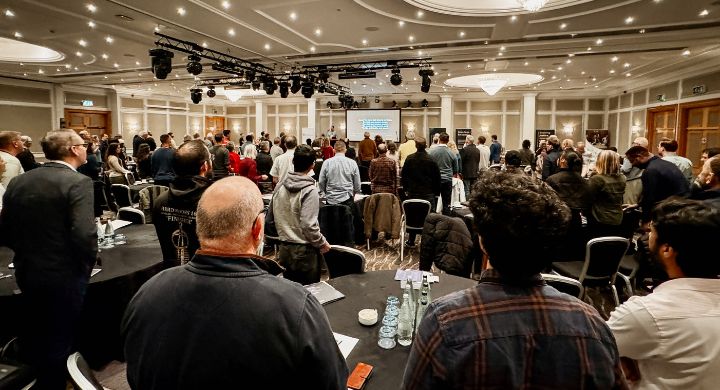
The palpable enthusiasm in the crowded conference room was a testament to the pertinence of the subject to the lives of ordinary Christians, who are becoming acutely aware of the need to be equipped for their increasing encounters with Islam and Muslims.
The Crescent and the Cross
Director of the Ezra Institute Joe Boot began the conference by comparing the foundations of Islamic and Christian culture. Contrasting two diametrically opposed understandings of God’s nature, the Islamic doctrine of Tawhid (the oneness of Allah) and the Christian doctrine of the Trinity, Joe elucidated the cultural implications of these doctrines.
He argued that the cultural outworking of a god who is an impersonal singular unity is the suppression of diversity, plurality and individuality, as is evident in the cultural stagnation of the Islamic world.
Unlike the covenantal God of the Bible, Allah does not interact with his creation or enter into relationship with his people. Instead, Muhammad is elevated as the focal point of Islamic practice, such that his life of military conquest and subjugation is regarded as the highest moral example.
Joe encapsulated well the practical consequences of this with a quotation from a seventh century Jewish text responding to the expansion of Islam: “there was no truth to be found with the so-called prophet, only the shedding of men’s blood”.
Islam and the nation
This quote served as a fitting introduction to the next presentation, in which Christian Concern’s Head of Public Policy, Tim Dieppe, turned from foundational principles to practical realities. He detailed, with shocking statistics and harrowing stories, the extent and consequences of Islam’s rapid growth and increasing political influence in the UK.
Tim condensed extensive research into a single overview presentation, but his numerous online articles explore the issues raised in greater depth, such as grooming gangs and attempts to suppress criticism of Islam.
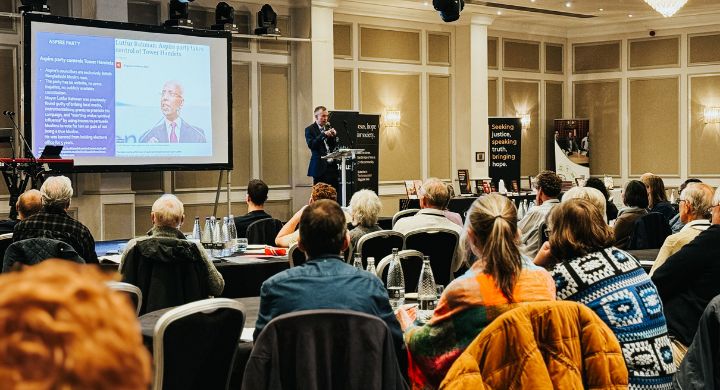
Substantiated as it was by empirical evidence displayed on over 100 slides, Tim’s talk powerfully impressed upon the audience the gravity of the situation. The resounding message was that Islam threatens to completely engulf the church if it is not countered by a robust biblical faith grounded in love and truth.
Tim closed with ‘five pillars’ of a Christian response to Islam. He urged us to love our Muslim neighbours, labour in prayer, confront Islam as a false ideology raised against the knowledge of God, expose the reality of Islam and resist its advancement in the UK.
Islam and the Church
Following Tim’s talk, it was no surprise that the audience eagerly awaited apologist Bob of Speakers’ Corner, as he approached the stage to speak about confronting Islam evangelistically.
Bob began by exhorting us to be ‘prepared to die’ as we face the challenge of Islam. He gave a sobering reminder that, while our policy debates centre around “islamophobia”, the global reality is that it is Christians in Islamic nations who are facing imprisonment, torture and death for their faith.
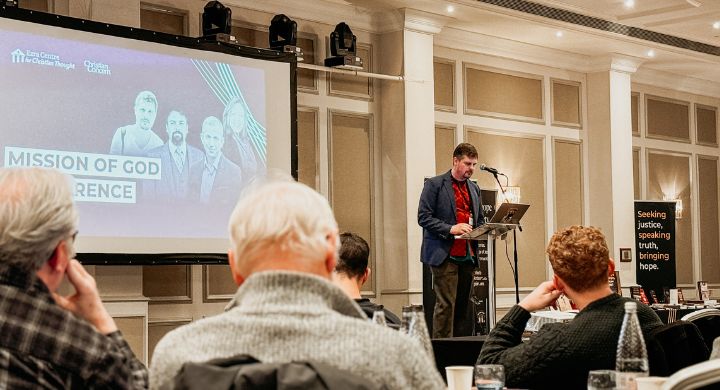
Bob’s presentation had two main focal points. First, the recovery and defence of Christendom, which has been abandoned in mainstream evangelicalism in favour of an individualistic emphasis on personal salvation over national and cultural transformation. This leaves us almost powerless in the face of Islam, a holistic worldview with its own legal and political system.
Second, the importance of living as a visible Christian community outside of formal church meetings. Muslims who convert to Christianity often sacrifice everything, including the strong communal bond that is so central to Islamic culture. They need to be embraced by a Christian brotherhood and receive a new family in place of the one they will inevitably lose.
Showing Christ to our Muslim friends
Following Bob’s focus on the church’s collective response, CEO of the One Truth Project, Beth Peltola, turned our attention to our individual evangelistic efforts, breaking down myths that hinder us from evangelising to Muslims.
In response to the popular assertion that Islam is “Abrahamic” Beth referred us to biblical teaching regarding the substance and object of Abraham’s faith (Genesis 18, Galatians 3:7).
Christians are frequently dissuaded from focusing on the deity of Christ and the Old Testament. However, Beth encouraged us to open the scriptures with Muslims, drawing their attention to the theophanies of the pre-Incarnate Christ, who is the image of the invisible God.
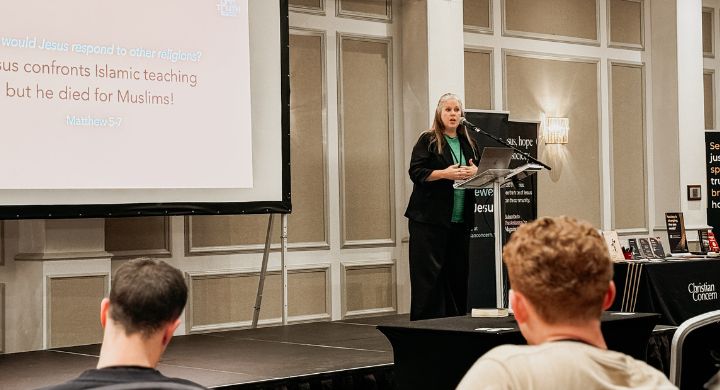
Christians are often deterred from evangelism because of their ignorance of Islamic beliefs, but Beth exhorted us to begin with ‘what we know’ and ‘who we know’: the Bible and the Lord Jesus Christ.
It was an encouragement to hear that if we have the word of God written in our hearts and minds, we will always be ready to answer Muslims.
Rising to the challenge of Islam
In the final Q&A session, the panellists were only able to answer a fraction of the long list of questions posed by the audience via Slido.
These questions mainly focused on some of the more practical challenges raised throughout the day, such as reaching men, young people, and Muslim women.
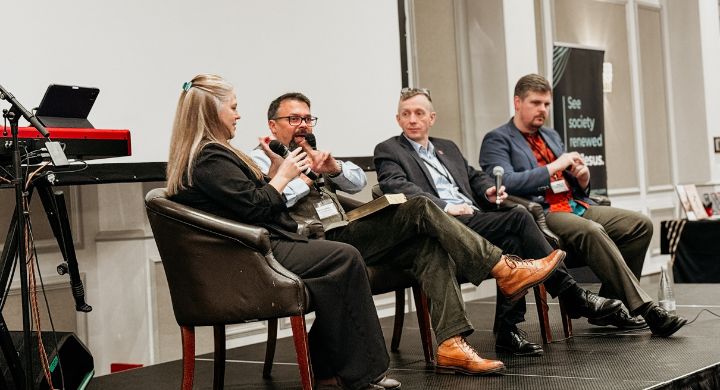
The panellists discussed combatting the perceived effeminacy of the church by recovering something of the militancy of the Christian faith, countering the evangelical over-emphasis on meekness, as well as challenging the prevalent truncated view of Christianity that confines our faith’s relevance to ecclesiastical life.
Bob commissioned us to take our evangelism to the ‘new Areopagus’ of social media, while Beth used personal testimonies from her long ministry to Muslim women to demonstrate the power of focusing on the distinctives of Christian theology.
The overarching message of the day was that Christians need to rise to the challenge of Islam, and we do this primarily by knowing and living out our own faith.
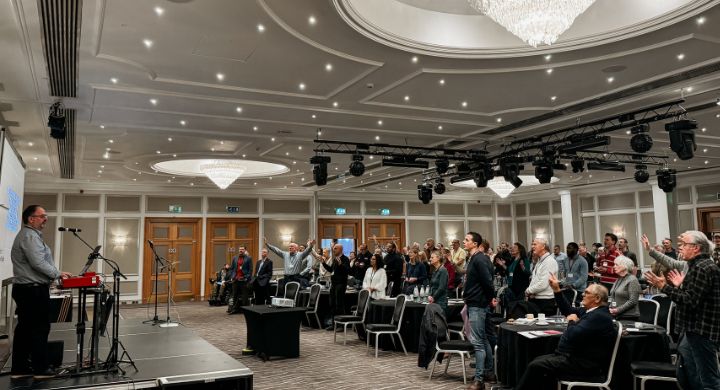
As the day closed, it was evident that attendees felt encouraged to continue growing in knowledge and faithfulness. For many, the conference will have only been the beginning of a long journey of contending for the advancement of the kingdom of Jesus Christ in every sphere of life.
Reflecting on the conference, Tim Dieppe said “It was great to gather in the centre of Birmingham to spend a day discussing the challenge of Islam. People are hungry to understand more about Islam and how we can respond and engage evangelistically with the increasing numbers of Muslims in the UK. Lots of engagement from delegates in Q&A sessions demonstrated people’s interest and desire to go deeper. It is time for Churches to start teaching about Islam and equipping their members to engage with it in an informed manner.”





